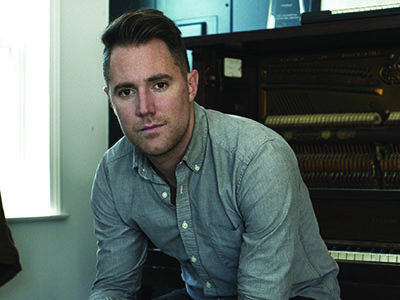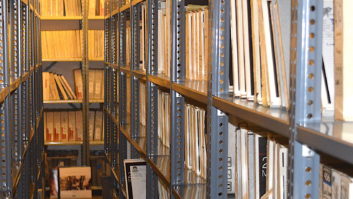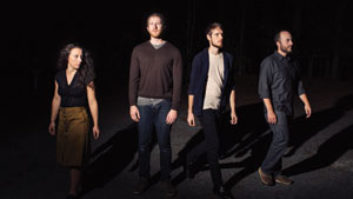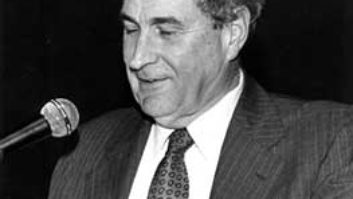
Keegan DeWitt, the 34-year-old indie rock musician, also composes music for HBO’s Divorce and the upcoming Fox comedy Making History. Handling multiple scoring gigs while maintaining his band Wild Cub, DeWitt often appears to be in more than one place at a time. He’s a driven and efficient dynamo who loves the act of collaborative composition, or what he has called “musical filmmaking.”
Unlike many composers for film and TV, DeWitt wasn’t classically trained for composition, but rather attended film school for directing and writing at SUNY Purchase in the upstate suburbs of New York City. He also attended an acting conservatory for two years. He’d been habitually recording music on a 4-track for years, the way some people keep a diary, “as a way of being creative, and for being in touch with my emotional world,” DeWitt says. When a friend asked him to score his student film, DeWitt’s music career began.
By the time he was 26, DeWitt had scored half a dozen indie movies, including some critical and festival darlings. However, in 2008, the cost of living in Brooklyn sent him packing to Nashville, where he was able to build a studio. While scoring a few small films a year and putting out solo singer-songwriter material, DeWitt met the guys with whom he’d form the band Wild Cub, and his life would take another turn. The band’s debut album of danceable indie rock, Youth (2013), and supporting live shows took a lot of DeWitt’s time; it was a slow build until the song “Thunder Clatter” became the band’s breakout hit. DeWitt found out about it while at the Berlinale film festival in Germany for one of his movies.
“Suddenly I got an email from our lawyer that was like, ‘Hey, do you know the song you made is charting on Sirius XM?’ I had no idea. Then within a month we had signed a record deal, and it’s been a crazy ride.”

DeWitt with Divorce star Sarah Jessica Parker
DeWitt found himself in growing demand from two different worlds—composing and rock ’n’ roll. The former indulges his proclivity for myriad genres such as minimalism (Queen of Earth, 2015), jazz (Listen up Philip, 2014), orchestral (This Is Martin Bonner, 2011), and hip-hop and electronic (Morris from America, 2016).
“I enjoy film composing because I can do a project, totally live in that world for three or four months, and move to something else,” DeWitt says. “You meet new people; it’s really inspiring; then there’s closure. The music business is so different. It’s so broken at this point, the only way to sustain that kind of career would be to [tour] nonstop.”
After a couple of hectic years of supporting Wild Cub and working on film scores on the side, DeWitt returned to his life of cranking out several film scores a year, which led to the call that would return him to his college stomping grounds.
Divorce, a dramedy starring Sarah Jessica Parker and Thomas Haden Church, takes place in wintry New York City and its suburbs. When DeWitt found out he was up for the job, he knew he could nail the feeling of that environment, but because it was an in-demand, high-profile gig, he wanted to give them something that would be the opposite of what they expected. The music supervisor, who had licensed a lot of ’70s soft-rock songs for the show, told DeWitt they wanted it to sound like an early-’70s domestic drama and mentioned flute.
“I try and take whatever limitation and turn it into a strength,” DeWitt says. “I like things when they are played nontraditionally. I took a bunch of small quartet string samples with lots of harmonics, glissandos and things like that, and layered those on top of a bunch of flutes and woodwinds, but played in an almost like Steve Reich-y percussive way, where they are doing patterns and arpeggiations rather than just a lyrical flute line.” something that was unique and had the same depth musically as they were going for with the show itself.”
DeWitt feels just as comfortable composing in a studio as he does using an ultra-compact mobile rig. For Divorce, he flew to New York on a week’s notice and set up temporarily in a production office just yards away from the shoot. “I enjoy that kind of boot-camp feel,” DeWitt says. “There’s an intangible thing I get instead of being in a windowless studio tons of miles away from wherever they’re shooting.”
This mini-rig includes an Apogee One audio interface/mic, a MIDI controller and a Universal Audio UAD-2 Satellite DSP Accelerator with plenty of UA plug-ins. DeWitt loves to pull material from Spitfire Audio’s many top-shelf sound libraries, but he also tries to use each new job as “an excuse to create my own treasure chest of samples.”
To accomplish this, DeWitt calls on musician friends in L.A. or Nashville—sometimes collaborating with them remotely—and records multiple takes of them using different creative miking techniques, or records himself playing guitar, bass or sample library material. He then dumps everything into Ableton Live and gets to work, building his sound library as he writes music.
“People like to think of composers as either very sample-oriented, or purists who only compose on piano and deal with an orchestra,” DeWitt says. “I think it’s interesting to meet those two worlds, to treat it like you are making a collage. I enjoy Ableton for that. It opens up a huge world of possibilities. I might have 50 saxophone phrases, but really all they are is an inspiration. I chop them up and re-pitch things, slow it down, speed it up, jump markers around, change the rhythm, change the pitch and length of the notes, stretch things out and layer things on top of each other.”
The Soundtoys 5 Effect Rack is another huge weapon for DeWitt, for the way users can creatively combine plug-ins into a custom signal chain. “I’ll end up throwing a crazy vocal slap effect on a piano. Or even their Decapitator [saturator], which is a more-traditional plug-in, feels crazy, every time you throw it in the Effect Rack,” DeWitt says.
Since wrapping Divorce in June, DeWitt scored a film a month until beginning Making History in November. Amidst all that, he also reunited with Wild Cub, which will release its second album soon. The band turned a rented house in Palm Springs into an impromptu studio equipped with DeWitt’s original Neve 1073 preamp/EQ and Adam A7X studio monitors. “I used to get really bass-y, big speakers that felt great while you were mixing,” he says. “The nice thing about the A7Xs is that, similar to the Yamaha NS-10s, they are very flat, and they make your music sound as unexciting as possible, but in a good way.”
To keep up with his hellacious pace of scoring and cutting band tracks, DeWitt says, “I keep everything where I can just reach there and grab the guitar and go,” he said. “I can drop it, grab a bass, a grab a synth and do it all as fast as possible. I like to keep things slightly messy and improvisational, so I can go back later and clean up. But every thought is that I’m moving as fast as possible. I’m overlapping on projects and doing two at a time, and it’s crazy. It’s a lot.”
After sending the team four cues in that style, DeWitt got the job and was able to spend three months working on the series last spring without crazy, last-second TV deadlines. “We got to dig in, try a whole bunch of ideas—from Irish drums to crazy flutes, to punk rock—and find





